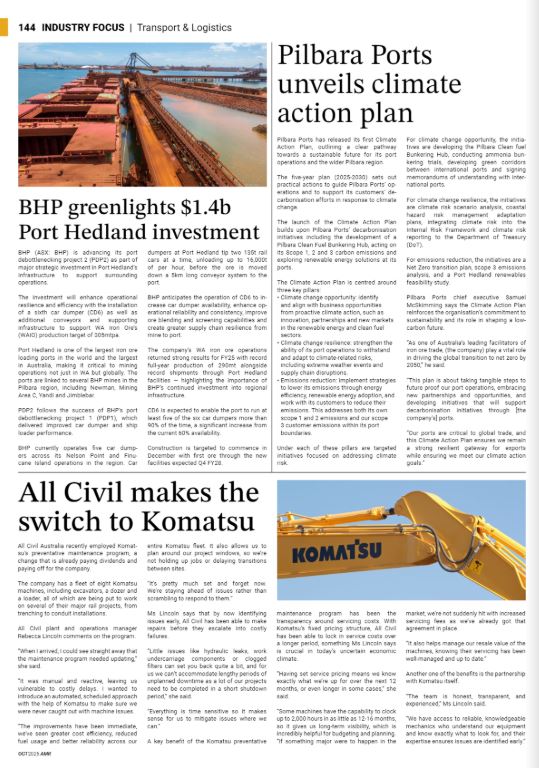Pilbara Ports unveils climate action plan

Pilbara Ports has released its first Climate Action Plan, outlining a clear pathway towards a sustainable future for its port operations and the wider Pilbara region.
The five-year plan (2025-2030) sets out practical actions to guide Pilbara Ports’ operations and to support its customers’ decarbonisation efforts in response to climate change.
The launch of the Climate Action Plan builds upon Pilbara Ports’ decarbonisation initiatives including the development of a Pilbara Clean Fuel Bunkering Hub, acting on its Scope 1, 2 and 3 carbon emissions and exploring renewable energy solutions at its ports.
The Climate Action Plan is centred around three key pillars:
- Climate change opportunity: identify and align with business opportunities from proactive climate action, such as innovation, partnerships and new markets in the renewable energy and clean fuel sectors.
- Climate change resilience: strengthen the ability of its port operations to withstand and adapt to climate-related risks, including extreme weather events and supply chain disruptions.
- Emissions reduction: implement strategies to lower its emissions through energy efficiency, renewable energy adoption, and work with its customers to reduce their emissions. This addresses both its own scope 1 and 2 emissions and our scope 3 customer emissions within its port boundaries.
Under each of these pillars are targeted initiatives focused on addressing climate risk.
For climate change opportunity, the initiatives are developing the Pilbara Clean fuel Bunkering Hub, conducting ammonia bunkering trials, developing green corridors between international ports and signing memorandums of understanding with international ports.
For climate change resilience, the initiatives are climate risk scenario analysis, coastal hazard risk management adaptation plans, integrating climate risk into the Internal Risk Framework and climate risk reporting to the Department of Treasury (DoT).
For emissions reduction, the initiatives are a Net Zero transition plan, scope 3 emissions analysis, and a Port Hedland renewables feasibility study.
Pilbara Ports chief executive Samuel McSkimming says the Climate Action Plan reinforces the organisation’s commitment to sustainability and its role in shaping a low-carbon future.
“As one of Australia’s leading facilitators of iron ore trade, (the company) play a vital role in driving the global transition to net zero by 2050,” he said.
“This plan is about taking tangible steps to future proof our port operations, embracing new partnerships and opportunities, and developing initiatives that will support decarbonisation initiatives through [the company’s] ports.
“Our ports are critical to global trade, and this Climate Action Plan ensures we remain a strong resilient gateway for exports while ensuring we meet our climate action goals.”

























